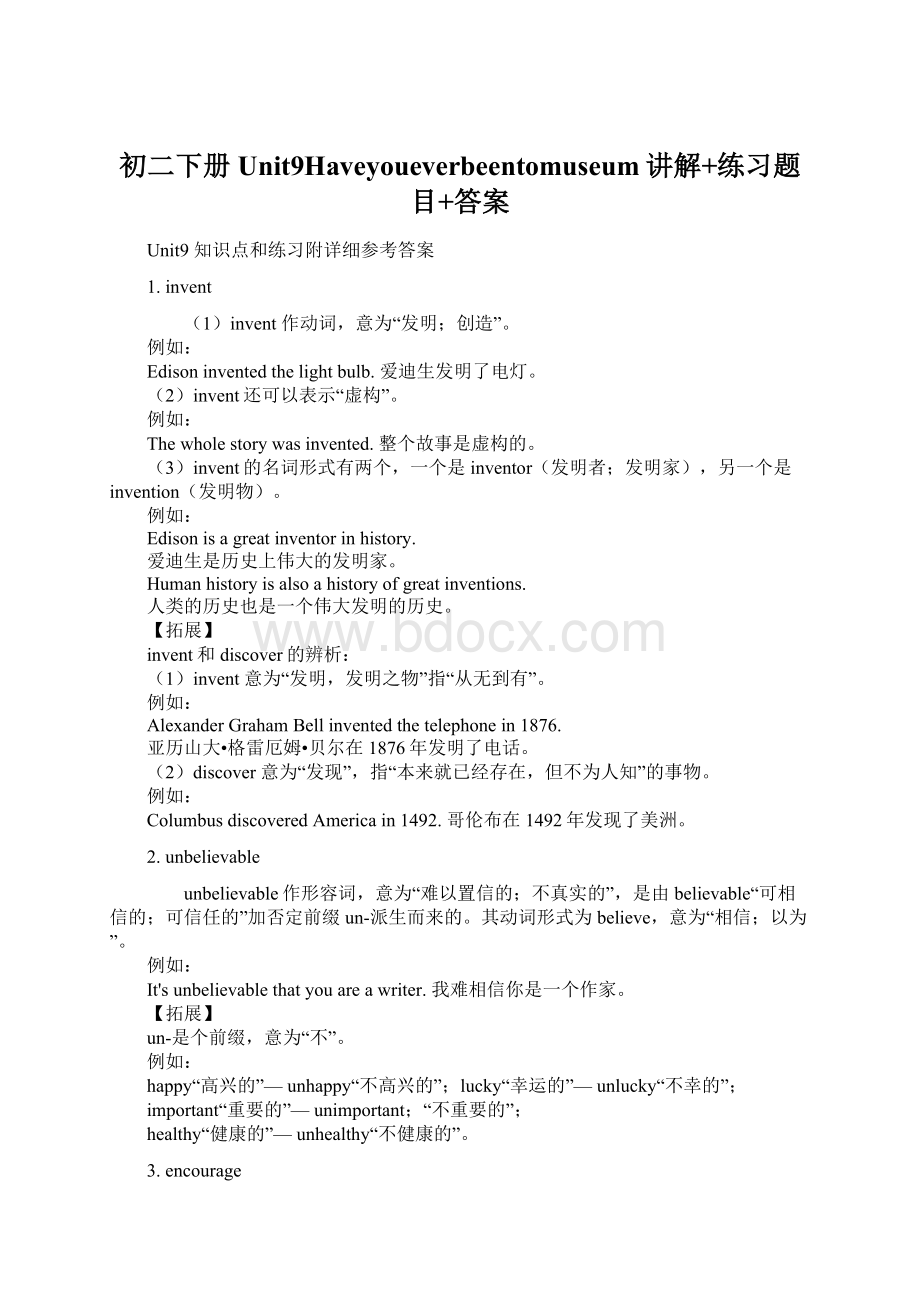初二下册Unit9Haveyoueverbeentomuseum讲解+练习题目+答案Word格式.docx
《初二下册Unit9Haveyoueverbeentomuseum讲解+练习题目+答案Word格式.docx》由会员分享,可在线阅读,更多相关《初二下册Unit9Haveyoueverbeentomuseum讲解+练习题目+答案Word格式.docx(13页珍藏版)》请在冰豆网上搜索。

important“重要的”—unimportant;
“不重要的”;
healthy“健康的”—unhealthy“不健康的”。
3.encourage
encourage作动词,意为“鼓励”。
encouragesb.todosth.意为“鼓励某人做某事”。
Theteacheroftenencouragesustostudyhard.
老师经常鼓励我们要努力学习。
Mymotherencouragedmetoenterthecontest.
妈妈鼓励我参加那场比赛。
(1)encouragesb.insth.意为“在……方面鼓励/助长某人”。
Don'
tencouragehiminlaziness.别助长他的懒惰行为。
(2)encouragement是encourage的名词形式,意为“鼓舞/鼓励”。
Theteacher'
swordswereagreatencouragementtohim.
老师的话对他是极大的鼓舞。
4.collect
collect作及物动词,意为“收集,搜集”。
collectstamps收集邮票 collectcoins收集硬币
collection作名词,意为“收藏品、收集物”。
是动词collect的名词形式,是由动词collect后缀-tion变化来的。
collector作名词,意为“收藏家”。
Thesearemycollections.
这些是我的收藏品。
Mybrotherhasaverygoodcollectionofstamps.
我的弟弟收集了许多邮票。
Markisafamousstampcollector.
Mark是一位著名的邮票收藏家。
5.acoupleof
acoupleof意为“少数;
几个”。
Heboughtacoupleofbooksforhisdaughter.
他为他的女儿买了几本书。
acoupleof还可意为“一双;
一对”。
Ifoundacoupleofsocksintheroombuttheydidnotmakeapair.
我在房间里找到两只袜子,但他们不是一双。
6.thousandsof
thousand是数词,意为“千”,当表示具体的“几千”时,用“基数词+thousand”,注意不加-s。
Therearesixthousandstudentsinthecity.这个城市有6000名学生。
(1)thousandsof表示“数千,成千上万的”这时thousand后要加-s,且后面有介词of,但是不能与数词连用。
Therearethousandsofpeopleonthesquare.在广场上有成千上万的人。
(2)表示数词的还有hundred“百”,million“百万”,billion“十亿”。
它们的用法和thousand一样,可以用来表示约数和确数。
7.whether
whether常引导宾语从句,表示“是否”之意。
当把一般疑问句的直接引语转化成间接引语时,常用if或whether作引导词。
Iaskedher,“DoyoustudyEnglishhere?
”我问她:
“你在这里学习英语吗?
”→
Iaskedherif/whethershestudiedEnglishthere.我问她是否在那里学习英语。
if和whether的辨析:
if和whether均可表示“是否”,一般情况下二者可以互换。
但在下列条件下,只能用whether而不能用if:
(1)if后不能直接接ornot。
(2)whether可作介词的宾语。
(3)whether后可接不定式。
(4)whether可用于句首。
(5)whether可引导主语从句、表语从句。
Everythingdependsonwhetherwehaveenoughmoney.
一切都取决于我们是否有足够的钱。
Whetheritisrightorwrong,Idon'
tknow.正确与否,我不知道。
Itdoesn'
tmatterwhetherhewillcomeornot.他来不来没关系。
8.mostly
mostly作副词,意为“主要地;
通常”。
Hereadstheoccasionalbook,butmostlyjustmagazines.
他偶尔也看书,但大多只看杂志。
Lizardslivemostlyinwarmclimates.
蜥蜴主要生长在气候温暖的地方。
HeworksmostlyinLondonoffice.
他通常在伦敦办事处工作。
句式精讲
1.I'
veneverbeencamping.
“have+been+现在分词”为现在完成进行时结构。
表示从过去某一时刻一直延续至今的动作。
在句中,说话人使用这一时态来强调自己从未有过野营的经历,欠缺这方面经验。
I'
vebeencleaningthehousebutIstillhaven'
tfinished.
我一直在打扫屋子,但我仍然没有做完。
Ihavebeenworkingfor12hours.
我已经工作了12小时了。
(刚结束了工作,或者还正在做并将继续)。
2.Iwonderhowmuchmorecomputerswillbeabletodointhefuture.
wonder作及物动词,意为“想知道;
对……感到怀疑”,常见的用法有:
(1)后接who,what,why,where等引导的宾语从句。
Iwonderwhosheis.我想知道她是谁。
Shewonderedwhatthechildwasdoing.
她感到疑惑,孩子究竟在干什么。
IwonderwhyAnnislate.我想知道安为什么迟到了。
Iwonderwheretheyhavegone.我想知道他们去哪儿了。
(2)后接that引导的宾语从句,表示“对……感到惊讶”,that常可省去。
Iwonder(that)shehaswontherace.
我对她赢了比赛感到惊讶。
(3)后接if或whether引导的宾语从句,常用来表示一种委婉的请求或疑问。
Shewonderedwhetheryouwerefreethatmorning.
她想知道你那天上午是否有空。
Iwonderifhewillsucceed.
我不知道他会不会成功。
3.Let'
sgotoonetomorrow.
let意为“让,允许”,表示“让(允许)某人做某事”应该说“letsb.dosth.”,不能说“letsb.todosth.”。
Letmehelpyou.让我帮助你。
Hismotherdoesn'
tlethimgooutatnight.
他母亲不让他晚上出去。
let'
s…是表示建议或请求的祈使句句型,let'
s是letus的缩写形式。
Let'
sgotoschool.咱们上学吧。
splaybasketballafterschool.咱们放学后打篮球吧。
s与letus在用法上略有区别。
在表示向对方提出建议,涉及双方的共同行为时,letus可以缩写成let'
s;
而表示请求对方允许做某事,不涉及对方行为时,letus不能缩写成let'
s。
s(=Letus)playsports.咱们做运动吧。
Letusknowyourtelephonenumber.
请把你的电话号码告诉我们。
(Letus不能缩写成Let'
s)
【注意】
以Let'
s开头的句子改为反意疑问句的时候,后面的附加疑问句用“shallwe?
”,因为Let'
s是把说话人包含在内了;
以Letus开头的句子改为反意疑问句的时候,后面的附加疑问句用“willyou?
”,因为Letus不包括对方。
4.It'
sreallyinteresting,isn'
tit?
是反意疑问句,表示对陈述句所说的事实提出相反的疑问,要求对方用yes或no来进行回答。
反意疑问句由两部分组成:
前一部分是陈述句,后一部分是疑问句,疑问句是由be,have,助动词或情态动词后接主语构成。
如果陈述句是肯定结构,反意疑问句须用否定结构;
反之,陈述句如果是否定结构,反意疑问句须用肯定结构。
反意疑问句的两部分,必须保持人称和时态的一致。
Heisold,isn'
the?
他老了,不是吗?
Heneverwentthere,didhe?
他从没有去过那里,是吗?
无论哪种形式的反意疑问句,回答时要遵循:
“Yes,后接肯定式”或者“No,后接否定式”。
—Thegirlishelpinghermotherwiththehousework,isn'
tshe?
那个女孩正在帮妈妈做家务,不是吗?
—Yes,sheis.是的,她在帮。
—No,sheisn'
t.不,她没有帮。
5.Theteaartperformancesshowhowtomakeaperfectcupofteawithbeautifulteasets.
howtomakeaperfectcupoftea是“特殊疑问词+动词不定式”,在句子中作动词show的宾语。
相当于特殊疑问词引导的宾语从句。
Idon'
tknowwhattodo=Idon'
tknowwhatIcandonext.
我不知道下一步做什么。
疑问词what,which,how,where,when等可以和动词不定式连用,构成不定式短语。
“疑问词+动词不定式”可以做主语、宾语、表语等。
Whentostartoffhasn'
tbeendecidedyet.什么时候出发还没决定。
(做主语)
Thequestioniswhichbustotake.问题是乘哪辆公共汽车。
(做表语)
“疑问词+动词不定式”可以由名词从句简化而来。
tknowwhatIshouldsay.→Idon'
tknowwhattosay.
我不知道该说些什么。
句式精练
I.句型转换,按要求完成下列句子。
1.Maryhasn'
tbeentoDalian.Ihaven'
tbeentoDalian,either.(改为同义句)
_______Mary_______I______beentoDalian.
2.Tomisthetallestboyinhisclass.(改为同义句)
Tomistallerthan___________________inhisclass.
3.Lindahasn'
tbeentoWuhan.Ihaven'
tbeenthere,either.(改为同义句)
Lindahasn'
tbeentoWuhan.____________.
4.She'
sbeentoQingdao
twice.(对划线部分提问)
__________________hasshebeentoQingdao?
5.Theyhavecleanedtheclassroom.(改为否定句)
They_______________theclassroom.
6.Hasyourbrotherfinishedhishomework?
(作肯定回答)
Yes,_______________.
1.Neither;
nor;
have
2.anyotherboy/theotherboys
3.Meneither
4.Howmanytimes
5.haven'
tcleaned
6.hehas
II.根据汉语提示,完成句子。
1.四分之三以上的人口是中国人。
Morethan_______ofthepopulationareChinese.
2.你将毫不费力地找到米饭、面条或饺子。
Youwon'
thaveany____________rice,noodlesordumplings.
3.我不知道你是否喜欢印度食品。
tknow______youlikeIndianfood.
4.天黑的时候去动物园或许很奇怪。
It__________________togotoazoowhenit'
sdark.
5.你可以选择在你喜欢的任何时间去那里。
Youcanchoosetogo__________________.
6.如果你不去买东西,我也不去。
Ifyoudon'
tgoshopping,__________________.
7.许多孩子已经听说那部电影了。
Lotsofchildrenhave_____________thatmoviealready.
8.我常看见他们在家写作业。
Ioften___________________theirhomeworkathome.
9.这本字典比其他的字典贵很多。
Thisdictionaryismoreexpensivethan__________________.
10.在博物馆有那么多好看的东西。
There'
s__________________toseeinthemuseum.
1.threequarters
2.problemgetting
3.whether/if
4.mightseemstrange
5.wheneveryoulike
6.neitherwillI
7.heardof
8.seethemdo
9.anyotherone/dictionary或theotherdictionaries
10.somuchfun
III.语法专练:
句型转化。
1.Ihaven'
twashedtheclothes.Neitherhasshe.(改为同义句)
Ihaven'
twashedtheclothes.She____________________________.
2.Shehasalreadyfinishedthehomework.(改为否定句)
She____________________________thehomework______________.
3.BothofthemhavevisitedMountHuang.(改为否定句)
____________________________them______________visitedMountHuang.
4.Neitherthisanswernorthatoneisright.(改为同义句)
____________________________theanswer______________right.
5.HehasneverbeentoNewYork.Ihaveneverbeenthere,either.(改为同义句)
HehasneverbeentoNewYork,and____________________________I.
1.hasn'
teither
2.hasn'
tfinished;
yet
3.Neitherof;
has
4.Neitherof;
is
5.neitherhave
IV.从方框中选择适当的句子完成对话。
A.IwishIwillgotherewithyouthatday.
B.ButIhaveneverbeentoanamusementpark.
C.Wherewillyougo?
D.Wehavenotimenow.
E.Howmuchistheticket?
A:
Haveyoueverbeentoanaquarium?
B:
Yes,Ihave.Iwenttherelastyear.___1___
NeitherhaveI.Iwanttogothere.Iwanttogotothespacemuseum,too.
Ihaven'
teverbeentothespacemuseum,either.Myfathersaidhewouldtakemethereoneday.
Howluckyyouare!
___2___
Iwish,too.Ibelievewewillhaveagreattimethere.
Yes.Nowit'
sgettinglate.___3___
Iwanttoseeafilminthetheaternow.
Iwanttogo,too.___4___
Twentyyuan.___5___Let'
sgo.
1-5:
BACED
巩固练习
I.单项选择。
1.—Howdoyougotoschooleveryday,bybikeorbybus?
—_______.Igotoschoolonfoot.
A.Both B.Either C.None D.Neither
2.______ofthestudentsinourschoolhaveseenthefilm.
A.Thirdquarters B.Threequarter C.Athreequarter D.Threequarters
3.Pleasebequiet.Ihave_______totellyou.
A.importantanything B.importantsomething
C.somethingimportant D.anythingimportant
4.HecanhardlyspeakEnglish,_______?
A.canhe B.can'
the C.doeshe D.doesn'
the
5.Theygaveaway______bookstoourschoollastyear.
A.thousandof B.twothousands C.thousandsof D.twothou